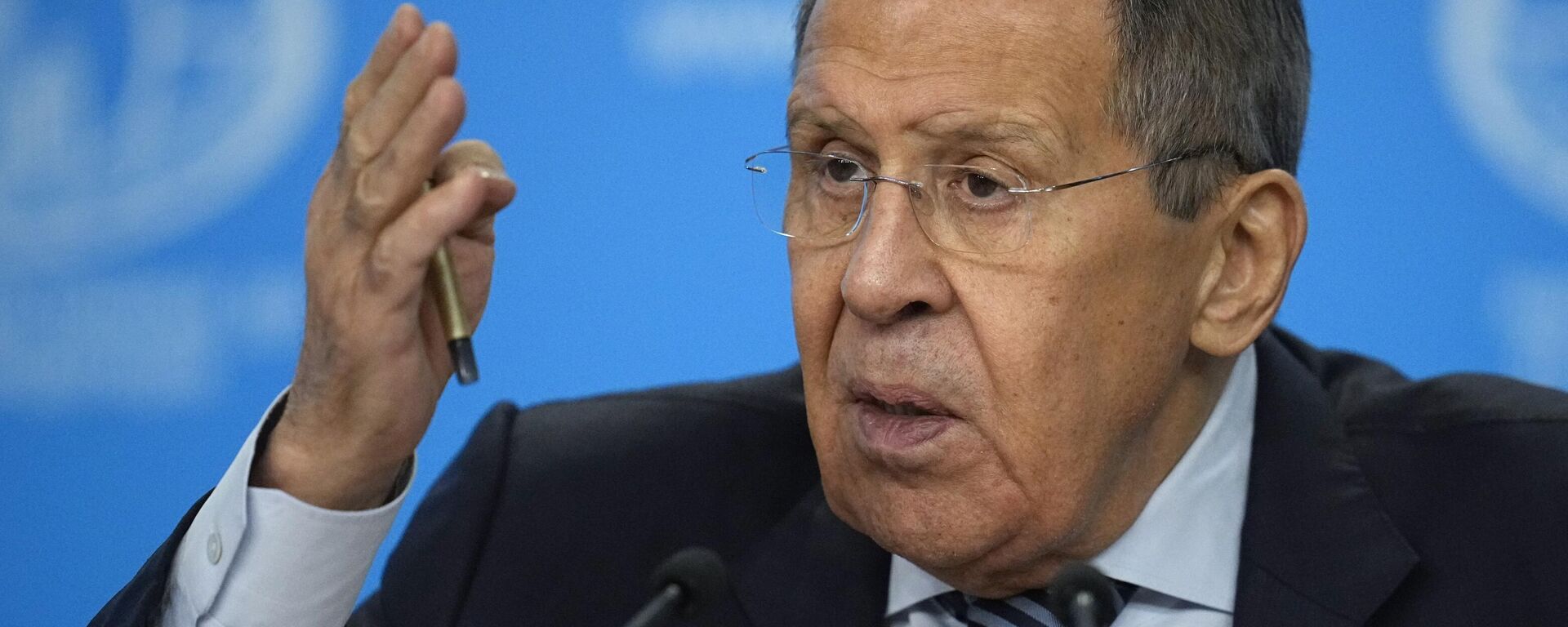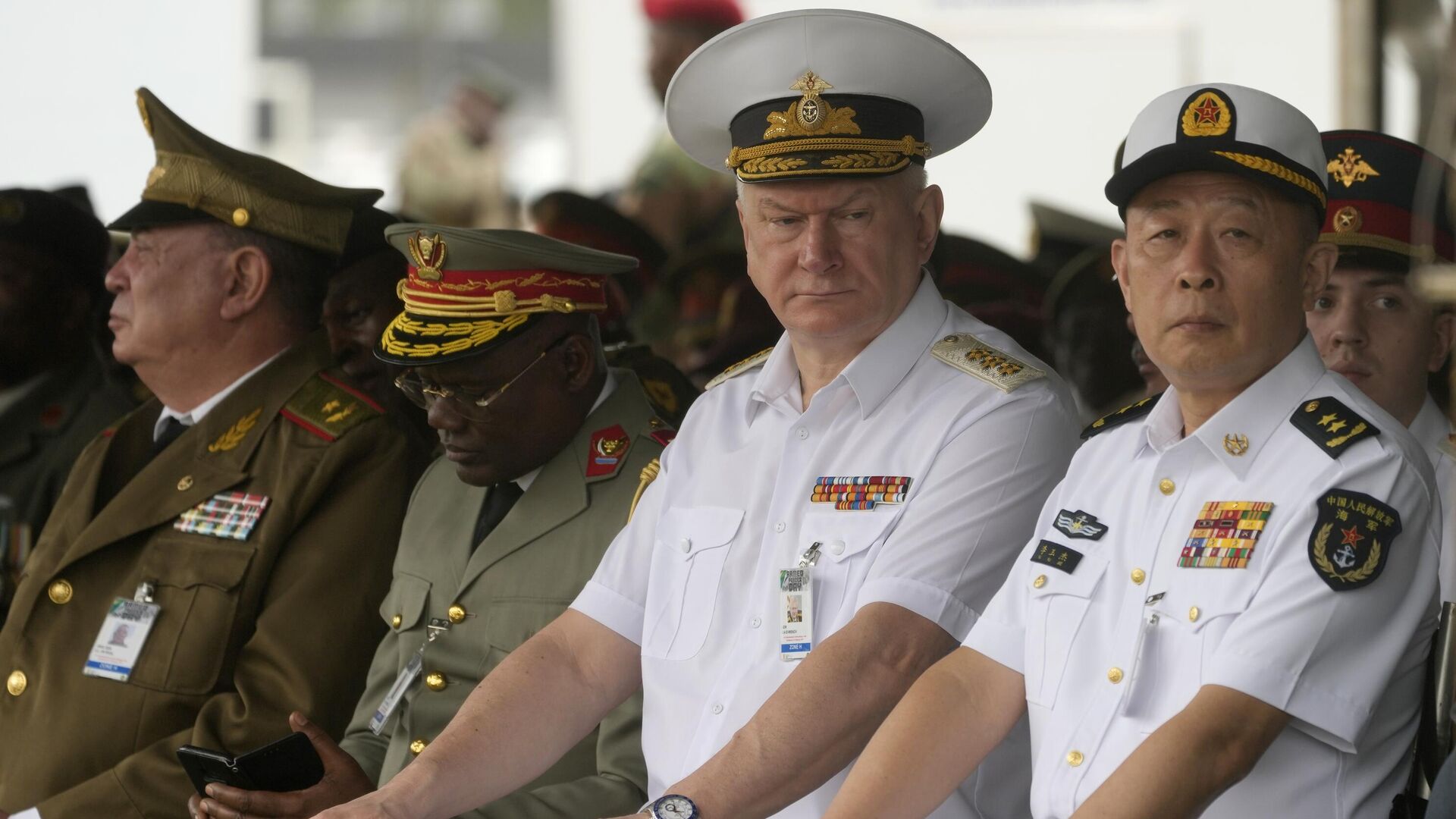https://sputnikglobe.com/20230222/washington-does-not-want-to-force-africa-to-choose-sides-in-military-cooperation-us-army-general-1107700327.html
Washington 'Does Not Want to Force' Africa to Choose Sides in Military Cooperation: US Army General
Washington 'Does Not Want to Force' Africa to Choose Sides in Military Cooperation: US Army General
Sputnik International
Washington does not coerce its African partners to make a choice in military cooperation between the US and its opponents - Russia and China, a representative of the US Africa Command, Major General Kenneth Ekman has said.
2023-02-22T16:32+0000
2023-02-22T16:32+0000
2023-02-22T16:33+0000
africa
us
russia
china
military cooperation
us africa command (africom)
atlantic council
naval drills
naval exercises
joint military exercises
https://cdn1.img.sputnikglobe.com/img/07e7/02/16/1107694559_0:0:2969:1671_1920x0_80_0_0_54a766b2f9565cc89bfde07d255664b9.jpg
Washington does not want to coerce its African partners to make a choice in military cooperation between the US and its opponents – Russia and China, a representative of the US Africa Command (AFRICOM), Major General Kenneth Ekman, has said."We respect and uphold the sovereignty and agency of each country. This includes appreciating that Africans have a choice in trusted security partners," he said at a seminar organized by the Washington Atlantic Council, adding that "while the US has much to offer, many African militaries have strong long-standing defense relationships with a variety of nations."However, the US wants them "to be forewarned," he noted, adding that the US National Security Strategy is clear about the US objectives to outcompete its supposed pacing threat, China, and constrain its alleged acute threat, Russia.He underlined that the US would cooperate with African states where it can - on shared challenges such as climate and energy security, pandemics and biodefense, and food insecurity.In Africa, US strategic competitors, particularly Russia, have had a strong and negative effect on African nations, and on US access and influence in Africa, according to him.However, some of the US' "African partners" might disagree with that statement.US 'Does Not Want to Compel' – But Does It?In May 2022, Washington adopted a bill to counter "malign" Russian activities in Africa, hindering the achievement of the United States' objectives and interests. In line with the bill, the country may punish African nations for interaction with Russia in various areas.At a meeting with his US counterpart Joe Biden in September 2022, South Africa's President Cyril Ramaphosa condemned the bill, calling it a "misplaced type of legislation."African countries' mistrust of US respect for sovereignty was also expressed by Jacob Mudenda, speaker of the National Assembly of Zimbabwe.He said that African countries reacted with disgust to the May 2022 bill, as it infringes on the sovereignty and territorial integrity of nations willing to cooperate with Russia.In her turn, South African Defense Minister Thandi Modise stated that Washington "threatens Africa, not just South Africa, of having anything that is even smelling of Russia."Along with Mudenda, Russian Foreign Minister Sergey Lavrov condemned the US bill, calling it "an American provocation."The US does not consider African nations its equals, he said, recalling a time when former US Secretary of State Mike Pompeo visited Africa to urge "everyone to stop trading with Russia and China, because both Russia and China do it for self-interest."In January this year, during a joint press conference with his South African counterpart Naledi Pandor after a meeting in Pretoria, South Africa, the Russian top diplomat commented on the pressure exerted by the US on countries wanting to cooperate with Russia.Lavrov added that the US, along with the EU, only appeals to principles of democracy when it corresponds with their interests, but undermines democratic principles in terms of international relations.While making statements on the "respected freedom of choice," US officials criticize the trilateral naval exercises that South Africa is holding with its BRICS (Brazil, Russia, India, China, and South Africa) partners Russia and China.David Feldmann, spokesperson for the US Embassy in South Africa, and White House Press Secretary Karine Jean-Pierre expressed concern over South Africa's preparations for the exercises.Former White House advisor Fiona Hill joined in the choir of critics, saying in a US congressional hearing this month that conducting these exercises is "not acceptable," adding that other countries "should not be doing that too."Earlier, South African Foreign Minister Naledi Pandor, in her turn, stated that holding military exercises with friends is the natural course of relations.Pandor underlined the importance of the trilateral drills for South Africa, saying it's part of the country's "agreements with many countries worldwide" and pointing to the fact nobody questioned South African military exercises with the US or France.Concerning the drills, Sergey Lavrov, in his turn, urged the West to respect their foreign colleagues.
https://sputnikglobe.com/20230118/lavrov-us-bill-countering-russia-in-africa-represents-colonial-mentality-1106460779.html
https://sputnikglobe.com/20230217/former-white-house-adviser-south-africas-naval-drills-with-russia-china-not-acceptable-1107492942.html
africa
russia
china
Sputnik International
feedback@sputniknews.com
+74956456601
MIA „Rossiya Segodnya“
2023
News
en_EN
Sputnik International
feedback@sputniknews.com
+74956456601
MIA „Rossiya Segodnya“
Sputnik International
feedback@sputniknews.com
+74956456601
MIA „Rossiya Segodnya“
washington, the us, africa, russia, china, cooperation, south african naval drills
washington, the us, africa, russia, china, cooperation, south african naval drills
Washington 'Does Not Want to Force' Africa to Choose Sides in Military Cooperation: US Army General
16:32 GMT 22.02.2023 (Updated: 16:33 GMT 22.02.2023) The second trilateral military drills between South Africa, China, and Russia, which began on February 17 and are taking place off South Africa’s east coast, have been repeatedly criticized by US officials as well as the country's media.
Washington does not want to coerce its African partners to make a choice in military cooperation between the US and its opponents – Russia and China, a representative of the US Africa Command (AFRICOM), Major General Kenneth Ekman, has said.
"We respect and uphold the sovereignty and agency of each country. This includes appreciating that Africans have a choice in trusted security partners," he said at a seminar organized by the Washington Atlantic Council, adding that "while the US has much to offer, many African militaries have strong long-standing defense relationships with a variety of nations."
"In United States Africa Command, we do not want to force our African partners to make a choice," Ekman claimed.
However, the US wants them "to be forewarned," he noted, adding that the US National Security Strategy is clear about the US objectives to outcompete its supposed pacing threat, China, and constrain its alleged acute threat, Russia.
He underlined that the US would cooperate with African states where it can - on shared challenges such as climate and energy security, pandemics and biodefense, and food insecurity.
"We are also clear-eyed about the destabilizing and adverse effects our competitors have on the free, open, and stable international order. In some parts of Africa, that order is at risk," Ekman said.
In Africa, US strategic competitors, particularly Russia, have had a strong and negative effect on African nations, and on US access and influence in Africa, according to him.
However, some of the US' "African partners" might disagree with that statement.
US 'Does Not Want to Compel' – But Does It?
In May 2022, Washington adopted a bill to counter "malign" Russian activities in Africa, hindering the achievement of the United States' objectives and interests. In line with the bill, the country may punish African nations for interaction with Russia in various areas.
At a meeting with his US counterpart Joe Biden in September 2022, South Africa's President Cyril Ramaphosa condemned the bill, calling it a "misplaced type of legislation."
"We should not be told by anyone who we associate with, and we should never be put in positions where we have to choose who our friends are," Ramaphosa told reporters after his meeting with Biden.
African countries' mistrust of US respect for sovereignty was also expressed by Jacob Mudenda, speaker of the National Assembly of Zimbabwe.
He said that African countries reacted with disgust to the May 2022 bill, as it infringes on the sovereignty and territorial integrity of nations willing to cooperate with Russia.
In her turn, South African Defense Minister Thandi Modise
stated that Washington "threatens Africa, not just South Africa, of having anything that is even smelling of Russia."

18 January 2023, 14:50 GMT
Along with Mudenda, Russian Foreign Minister Sergey Lavrov
condemned the US bill, calling it "an American provocation."
The US does not consider African nations its equals, he said, recalling a time when former US Secretary of State Mike Pompeo visited Africa to urge "everyone to stop trading with Russia and China, because both Russia and China do it for self-interest."
In January this year, during a joint press conference with his South African counterpart Naledi Pandor after a meeting in Pretoria, South Africa, the Russian top diplomat commented on the pressure exerted by the US on countries wanting to cooperate with Russia.
"[The US] is publicly saying that those who cooperate with Russia will regret it," he stated, answering a question from Sputnik at the press conference. "Through threats and pressure, the US, and the British too, are crossing all red lines."
Lavrov added that the US, along with the EU, only appeals to principles of democracy when it corresponds with their interests, but undermines democratic principles in terms of international relations.
While making statements on the "respected freedom of choice," US officials criticize the trilateral naval exercises that South Africa is holding with its BRICS (Brazil, Russia, India, China, and South Africa) partners Russia and China.
David Feldmann, spokesperson for the US Embassy in South Africa, and White House Press Secretary Karine Jean-Pierre expressed concern over South Africa's preparations for the exercises.
Former White House advisor Fiona Hill joined in the choir of critics, saying in a US congressional hearing this month that conducting these exercises is "not acceptable," adding that other countries "should not be doing that too."

17 February 2023, 01:48 GMT
Earlier, South African Foreign Minister Naledi Pandor, in her turn, stated that holding military exercises with friends is the natural course of relations.
Pandor underlined the importance of the trilateral drills for South Africa, saying it's part of the country's "agreements with many countries worldwide" and pointing to the fact nobody questioned South African military exercises with the US or France.
"These are all part of exercises we undertake […] to be able to respond to a range of situations, including disaster management, which our military often plays a role in addressing. So, I just think it’s important that we regard all countries as sovereign nations and not stop doing so when it suits us," she said.
Concerning the drills, Sergey Lavrov, in his turn,
urged the West to respect their foreign colleagues.
"If you respect other countries, let them pick their sides," the minister said, concluding: "We simply advocate for each country to have its own rights in the international system, as stipulated by the UN Charter."




